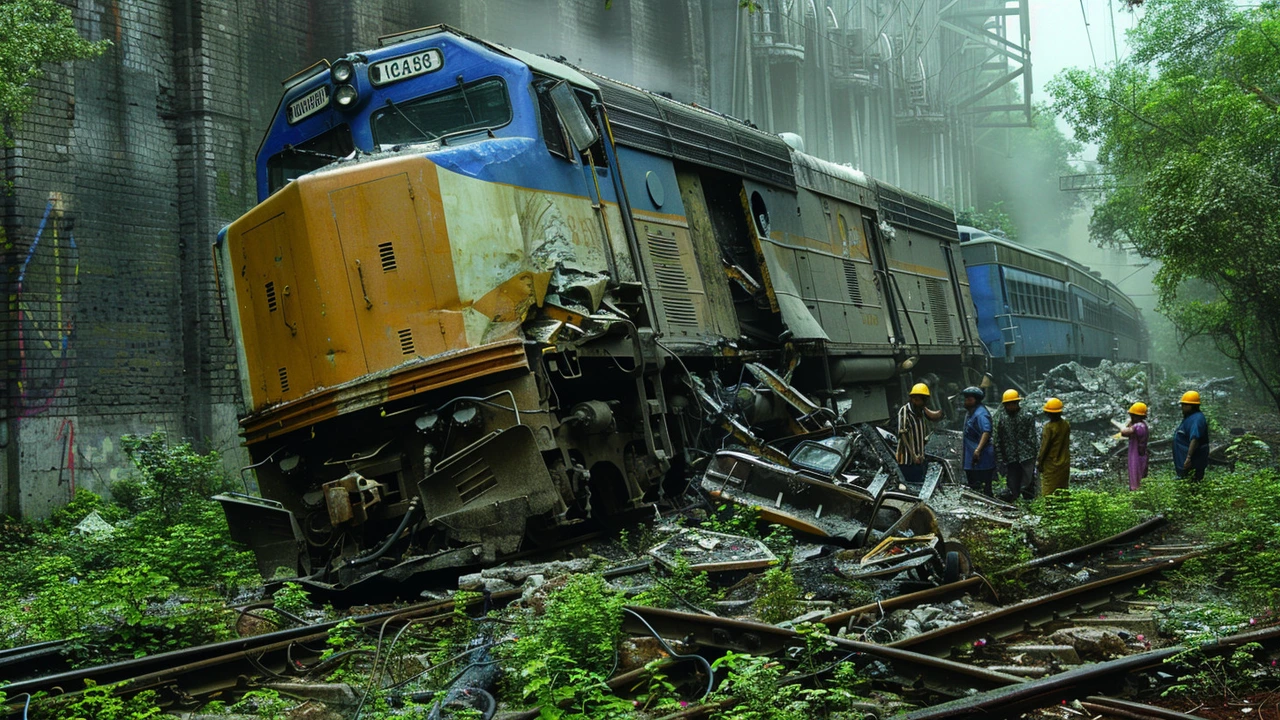
Disparity in Ex-Gratia Relief: A Letter from E A S Sarma
In recent weeks, India has witnessed two tragic incidents that have grabbed national headlines and provoked widespread outcry. On June 28, 2024, a major accident at Delhi Airport led to the collapse of a section of the roof, resulting in multiple fatalities. Not long after, another disaster struck in West Bengal when the Kanchenjunga Express derailed, claiming the lives of several passengers. In the wake of these calamities, the government announced compensatory measures for the victims, but a glaring disparity in the ex-gratia relief provided has provoked stern criticism from E A S Sarma, a former Secretary to the Government of India.
The Letter to the Railway Minister
Addressed to Shri Ashwini Vaishnaw, the current Railway Minister, Sarma's letter underscores a notable inconsistency in the relief amounts provided to the victims of these two accidents. The Ministry of Civil Aviation declared an ex-gratia relief of Rs 20 lakhs for each deceased victim of the Delhi Airport incident. In contrast, the Railway Ministry announced an ex-gratia relief of only Rs 10 lakhs for each person who lost their life in the Kanchenjunga Express accident. Sarma found this discrepancy not only stark but also deeply unjust.
Gross Negligence and Its Consequences
Both calamities were rooted in gross negligence on the part of the responsible government agencies, as Sarma points out. The question then arises: why should the victims of one incident receive double the compensation as those of the other? Sarma argues that this policy is not only inconsistent but also discriminatory. Railway passengers, who are typically less affluent than air travelers, deserve an equal if not greater degree of support in such tragic circumstances.
Implications for Social Justice
The ex-gratia policy's inherent bias becomes even more pronounced when considering the socio-economic backgrounds of those affected by the Kanchenjunga Express accident. Railway passengers often represent a cross-section of Indian society that is economically vulnerable. Sarma emphasizes that it is fundamentally unjust for this group to receive lesser compensation solely based on the mode of transportation they were using. This disparity, according to Sarma, undermines the principles of equity and social justice that the government should uphold.
Call for Policy Consistency
Sarma’s letter doesn't stop at highlighting the disparity; it goes further to advocate for a consistent and unified policy for ex-gratia relief across all modes of transportation. He requests the Railway Ministry to enhance the relief amount from Rs 10 lakhs to Rs 20 lakhs, aligning with the Civil Aviation Ministry’s compensation for the Delhi Airport roof collapse victims. A consistent ex-gratia policy would not only eliminate biases but also ensure that all citizens receive fair treatment in times of such unprecedented loss and grief.
Legal and Ethical Responsibilities
The government's ethical responsibility towards its citizens is not limited to mere token gestures of financial aid. Policies on compensation should reflect a sincere commitment to justice and equity, especially when the state holds liability for the incidents in question. By rectifying the ex-gratia discrepancy, the government can send a strong message that it values the lives of all its citizens equally, irrespective of their economic status or the mode of transportation they use.
An Appeal for Change
Sarma's letter is a poignant appeal for change, a call to acknowledge and correct the injustices in the system. Enhancing the compensation for the Kanchenjunga Express victims is not just about money; it is a step towards rectifying a broader systemic issue. It is about ensuring that the government's relief measures are reflective of its commitment to social justice and equity.
Public Reactions and the Way Forward
The public has also vocalized its discontent with the current policies. Many citizen forums and social media platforms have seen an outpouring of criticism, with numerous calls for equitable treatment of all victims. This issue has sparked debates on the need for a comprehensive review of the government's relief policies across varied sectors.
A re-evaluation and subsequent adjustment of the ex-gratia relief amounts would not only pacify public outrage but also align the government's actions with its ethical duties. It would set a precedent, ensuring that future policies are crafted with fairness and equality at the forefront.
In summary, Sarma's letter to the Railway Minister brings to light an important issue that goes beyond mere numbers. It questions the very principles upon which compensatory policies are based and calls for a shift towards a more fair and just approach in dealing with the victims of such tragic incidents. His appeal is a reminder that policies should be shaped with a keen sense of justice, compassion, and equality, ensuring that every citizen, regardless of their socio-economic status, is treated with the dignity and respect they deserve.
July 2, 2024 AT 15:42
Stop the emotional manipulation. The airport was a structural failure under civil aviation. The train derailment was due to poor track maintenance by the railways-two different departments, two different budgets. Equal compensation? That’s not justice, that’s populist nonsense.
July 3, 2024 AT 13:31
Wake up. The government doesn’t owe you a damn thing. You take the train? You accept the risk. Air travel? High-end service, high-end liability. You want Rs 20 lakhs? Then pay the same fare as first class. Stop whining about equity-this isn’t a socialist utopia. You get what you pay for.
July 4, 2024 AT 03:46
I cried reading this. I remember my uncle-he took the Kanchenjunga Express every year to visit his sister. He never flew. Never even held a boarding pass. He was proud of his train tickets, said they carried the soul of India. Now he’s gone. And they gave his family half? That’s not policy. That’s a betrayal. Please, someone make this right. Not for the headlines-for him.
July 4, 2024 AT 23:46
One cannot simultaneously uphold the principle of equal moral worth of human life and institutionalize differential compensation based on the mode of transit. The state, as the custodian of public infrastructure, bears fiduciary responsibility for all modes under its purview. The disparity constitutes a de facto hierarchy of value, wherein the life of a railway passenger is implicitly assigned a lower cardinal utility than that of an air traveler. This is not merely fiscal inconsistency-it is epistemological injustice.
July 6, 2024 AT 10:59
Same money. Same loss. Same grief. Fix it. No debate.
July 7, 2024 AT 20:25
People like Nikhil are soft. This isn’t about fairness. It’s about weakness. The railways are a national asset. They’re not some private airline. You want more money? Then fix the tracks yourself. Stop begging for handouts from a system that keeps India moving. The airport got paid because it’s a showcase. The train? It’s for the masses. That’s the reality. Stop crying.
July 9, 2024 AT 07:05
Let’s be honest-this is a distraction. The airport collapse was caused by a private contractor using substandard steel from a Chinese supplier with ties to the CCP. The train derailment? Corrupt railway officials selling fake signal parts to a shell company owned by a minister’s cousin. The compensation gap? A smokescreen. They’re not paying more for the airport because they care-they’re covering up the real scandal. The 10 lakh payout? A bribe to silence the poor. Wake up. This isn’t injustice. It’s a cover-up.
July 10, 2024 AT 07:40
My heart is breaking. 🥺 I can’t sleep thinking about those families on the train… the mother holding her child’s stuffed bear… the old man with his ticket still in his pocket… 🌹 This isn’t policy. This is a soul wound. Please… someone in power… just… fix it. For the love of all that’s holy. 💔






July 1, 2024 AT 10:59
It’s wild how we treat lives differently based on whether you took a train or a plane. I’ve ridden the Kanchenjunga Express-smoke, chai, kids crying, old folks napping. These aren’t ‘lower-class’ passengers, they’re just people trying to get home. Rs 10 lakhs feels like a slap in the face when the airport got double. No one asks for a medal when they lose someone. Just fairness.